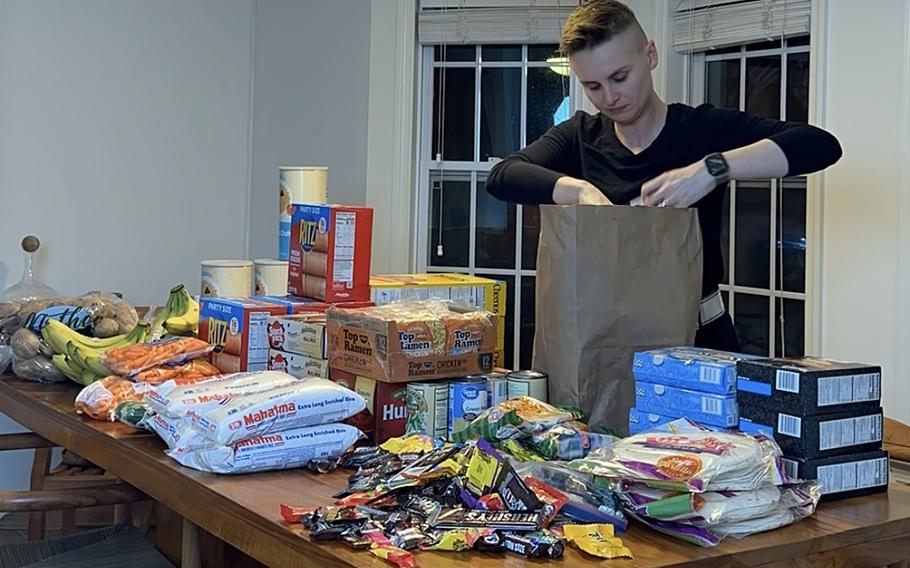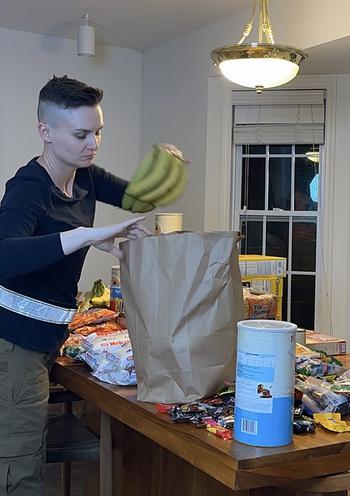
In this undated photo, military spouse and comedian Ashley Gutermuth packs up groceries for military families living on or near Joint Base McGuire-Dix-Lakehurst in New Jersey. Gutermuth and another military spouse, Heather Campbell, have initiated a grassroots campaign to help feed military families experiencing food insecurity. (Ashley Gutermuth)
Two social media influencers are tackling food insecurity among U.S. military families through a grassroots effort that they would like to see duplicated by others.
Military spouses Ashley Gutermuth, a comedian who has appeared on “The Tonight Show with Jimmy Fallon,” and Heather Campbell, a registered dietitian and food security advocate, say too many military families don’t have enough to eat.
And they’re doing something about it through a hands-on effort to anonymously buy groceries or cook meals for struggling military families.
Since December, Gutermuth has purchased and delivered more than $600 worth of groceries for about 10 military families.
Campbell, who started in July, estimates that she has cooked meals that have fed more than 50 people. She recently delivered meals to six families in a 24-hour period.
They also advocate for the cause through their respective platforms, including their Instagram pages, @ashgutermuth and @glorynutrition.

Military spouses Ashley Gutermuth, pictured here bagging up groceries, and Heather Campbell are helping to feed military families experiencing food insecurity by buying groceries and cooking meals. The women hope their efforts inspire others to help military families get the food they need. ( Ashley Gutermuth)
“What I and Ashley are doing is just making sure these families feel seen, they feel cared for, and they feel like they can take a moment to breathe and just take care of themselves,” said Campbell, whose husband is in the Air Force and assigned to Eielson Air Force Base near Fairbanks, Alaska.
Once or twice a week, the couple pay for and cook meals for military families living on or near the base.
A Rand Corp. study released this month found that 25% of active-duty service members were food-insecure, with Army personnel and on-base residents at higher risk.
A 2022 Military Family Advisory Network study found that 1 in 6 military and veteran families was experiencing food insecurity.
The U.N.’s Food and Agriculture Organization defines food insecurity as lack of “regular access to enough safe and nutritious food for normal growth and development and an active and healthy life.”
The U.S. Department of Agriculture does not track the number of military people receiving benefits through its Women, Infants and Children program, which provides vouchers for the purchase of nutritional foods.
A similar program, WIC Overseas, which is administered by the Defense Department and serves families at military bases outside the U.S., had about 7,825 people enrolled as of Jan. 5.
The reasons behind the problem of food insecurity in the military are varied and in some cases unclear, according to the Rand study, which Congress directed the Pentagon to sponsor as part of the 2020 National Defense Authorization Act.

A cartload of groceries recently purchased by Ashley Gutermuth, who along with another military spouse, Heather Campbell, is helping to feed military families experiencing food insecurity. Gutermuth estimates she has spent more than $600 buying basics, such as oatmeal, bread and bananas for about 10 families. (Ashley Gutermuth)
But some advocates, including Campbell and Gutermuth, say insufficient cost-of-living allowances, mounting debt from multiple moves and high spousal unemployment are some of the reasons military families go hungry.
Student debt, rising food costs and poor financial literacy also account for the food struggles of military families, the women say.
The problem doesn’t generally stem from financial irresponsibility or splurging on things like fancy cars, Gutermuth said.
“They’re not spending all their money on Dodge Chargers,” she said she tells people who are surprised about the problem and may have preconceived notions.
For example, active-duty enlisted personnel at an E-2 pay grade earn about $24,660 annually in base pay, excluding housing allowance and supplemental pay, according to an online table compiled by the Defense Finance Accounting Service.
When pay and family size are factored in, it’s easier to understand why some military families can’t buy enough groceries, said Gutermuth, who lives with her husband on Joint Base McGuire-Dix-Lakehurst in New Jersey.
No matter the causes, Gutermuth and Campbell say it’s important to address the issue without judgment. It shouldn’t matter why someone needs food, they say.
“Let’s make sure you’re fed and cared for,” Campbell said. “Let’s also set you up with tools and resources to continue to make better decisions so that you are creating a better future.”
Both hope that their work inspires others, such as service organizations, food pantries and the like, to pitch in and help feed military families.
“We need to scale it up,” Gutermuth said. “This is happening at every base.”